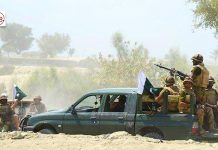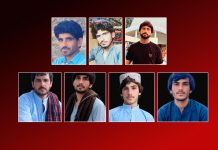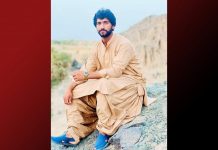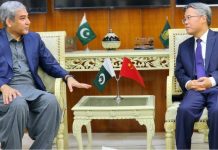Author: Ali Jan Maqsood
From their modest cottage in Singanisar, Turbat, Balach and Doda watched a helicopter hovering above them, carrying the former martial law administrator and president of Pakistan, Pervez Musharraf, in 2007. This was the same year when Nawab Akbar Khan Bugti was ‘martyred.’ It was a three-day visit by Musharraf to the district just before the general elections. On this occasion, all government schools remained closed for three days. The young boys gazed at the helicopter, wondering how Musharraf would appear. At the tender age of 7, all they could envision was a devil-like figure often depicted in Indian movies at that time. Balach even imagined Musharraf as a giant man with a tail and a sword to slay people. Doda was frightened. They made a pact not to leave their neighborhood until the president had departed.
This is the story of two friends, Balach and Doda. Balach hails from Gishkore, while Doda is from Hochat (Dasht, Turbat). Their families had settled in Singanisar before they were born, and they had grown up together. They attended the same school and studied the Quran in the same Zigrana (a place of worship for the Zigri sect of Muslims) in their neighborhood. Balach’s father served as the spiritual leader in the Zigrana, while Doda, fatherless, was cared for by his mother, who looked after him and his two sisters.
After completing middle school, both of them decided to move to High School Absar (Turbat) to pursue science for their matriculation. Simultaneously, they enrolled in DELTA (an English language academy) in the evenings. They were classmates at both school and the language center. They were academically gifted and often dressed in the same colors after school, as the school uniforms were already standardized. They shared many similarities and were well-liked in Singanisar for their respectful demeanor. They were fond of the children in their neighborhood and showed great respect to their elders. In short, they were the pride of the entire community.
While Balochistan witnessed severe human rights violations due to the ‘Kill and Dump’ policy, Baloch leaders continuously encouraged youth to pursue education and understand the needs of the nation’s future. Balach and Doda, although unaware of the scientific aspects of the Baloch movement, understood that a prolonged war of independence was unfolding in Balochistan, affecting every Baloch individual: some were unlawfully detained, others were killed, and some joined the militants in the mountains. They mentally prepared themselves for their own potential challenges and went to sleep with the thought, “This could be our last night of comfort.”
Their time might have come, but circumstances changed when the crackdown suppressed the insurgency. Eventually, people believed that things had calmed down, and the war had ended. The mental trauma lessened, and the priorities of the common people shifted, including Balach and Doda.
In 2019, they applied for reserved seats in universities in ‘sister provinces.’ The University of the Punjab, Lahore, offered two seats in each department. Fortunately, both of them gained admission to the Law Department at the university. It was a momentous occasion for them because they had spent their entire childhood together, and now they were entering the same legal profession that would accompany them for a lifetime. Their goal was to stay together throughout their lives. They chose the legal field because it was a professional path that allowed them to be together by joining a law chamber after graduation. They were very excited about their educational and professional journey. The residents of Singanisar were both happy and sad—happy because they secured admission to a prestigious university and would be together, but sad because they would be away from their community for five years. In simple terms, the community had grown accustomed to their presence.
However, they had to leave, and they received a call from a member of the Baloch Students Council, Lahore, instructing them to leave Turbat within a day and reach Lahore as soon as possible. With high hopes and dreams, they left Turbat and reached Lahore from Quetta in three days. On the way from Quetta to Lahore, they anticipated Lahore as a city of warmth and hospitality. However, when they reached the city’s entrance, the police boarded their bus and ordered them to disembark. There were approximately eight Baloch individuals, all seemingly students, on the bus. They were all removed from the bus and subjected to thorough checks. They were asked probing questions, and their bags were closely inspected. They looked at each other in shock. Initially, they were dumbfounded, but they eventually dismissed it, attributing it to the tight security in major cities. Balach reassured Doda, ignoring the fact that only Baloch students were singled out and subjected to such scrutiny. “We will deal with this when we become lawyers,” Doda added.
Upon reaching the hostel, they were welcomed by the Baloch Students Council (BSC) Lahore. They were accommodated in a room shared with Rashid from Turbat, a student of BS Philosophy in his last semester. He had a cigarette, and his hair and beard were quite long, making him less talkative. Engrossed in his studies, he appeared to be lost in his own world. They introduced themselves to him and discussed the current situation in Turbat after a significant crackdown on political activists, especially and others in general. He hadn’t been to the city for three years and missed his hometown immensely. Rashid shared that he had been arrested in 2014 and released after three months of torture. His parents had sent him to Lahore while he was in intermediate.
They liked Rashid for his bookish nature but disliked his habits and appearance. He smoked heavily, which was a stark contrast to their own views on smoking. They had never considered smoking and never thought of someone their age indulging in it. They associated smoking with individuals in midlife, typically in their 40s. However, the university hostel exposed them to a completely different environment. They made a pact to stay away from smoking while adapting to the hostel atmosphere.
The following day, they wore matching outfits and Balochi chawat (shoes), as they did in High School Turbat and Atta Shad Degree College Turbat on their first day. They were excited. Unlike other departments at the university, the Law Department had its own building and a boundary wall, complete with a gate. When they reached the gate, security personnel stopped them and requested their identification. Doda explained, “We have secured admission, and today is our first day.” The security personnel asked for their admission slips, and after verifying them, they advised the two to wear appropriate attire in the future. Doda, perplexed, repeated, “Appropriate attire?” looking at Balach. Nevertheless, they complied and entered the building.
Inside the college, they were surprised to see everyone in shirts and trousers. They wondered if this was the cultural attire for Punjabis, so they proceeded. When they reached the hall’s veranda, some students, apparently from Punjab, laughed loudly among themselves, referring to them as “junglis” (people from the jungle). Both were puzzled and exchanged looks. They ignored the comments and entered the classroom. A teacher, Athar Ullah from Lahore, arrived and asked Balach and Doda to stand up while instructing others to sit. He scolded them for their attire, asking, “Are you from Balochistan?” in a somewhat annoyed tone. Balach responded, “Yesss, Sir.” The teacher ordered them to leave the class, declaring them ‘junglis.’ They pleaded, “Sir, please, let us off this time, and we’ll change our attire tomorrow.” The teacher remained firm, and they were dismissed.
They left the classroom and returned to the hostel. Rashid was in their room, sleeping. When he noticed them, he inquired whether they had attended the class. Balach explained that they had gone but were asked to leave due to their clothing. Doda was close to tears. Rashid lit a cigarette and reassured them not to worry. He explained that this was Punjab, where anything Baloch-related was not preferred. He provided a detailed account of how Baloch students faced discrimination openly on campuses. “Don’t worry, being born Baloch is not a crime,” Rashid assured them, adding, “We are fortunate to have what we have. They lack it, and that’s why they behave this way.” His words provided a glimmer of hope during their challenging beginning.
They gradually adapted to facing and challenging Punjabi discrimination. Days turned into months, and months into years. After Rashid’s departure, they were the only two left in the room. They not only excelled in their studies but also acquired knowledge beyond their curriculum. They learned about the Baloch cause, the historical and ideological aspects, and the prevailing circumstances. They organized study circles to explore various historical, ideological, and scientific facts and theories, much like they had done in their community. They became the driving force of the Baloch Council in Lahore, just as they had been in their hometown.
After completing their third year of college, they prepared to return home. They made almost all the necessary arrangements and planned to stay in Turbat for a month before returning to Lahore. They set themselves the task of reading two important books during their break. They both agreed and planned to visit the market to buy supplies for their return and book their tickets. They completed the required tasks and returned to the hostel. Before going to sleep, Balach expressed his excitement about returning home after a long absence, with tears welling up in his eyes. Doda echoed Balach’s sentiments, wondering how everyone would receive them. They pondered whether Nako Sakim would remember them, and if Lala Rasheed and Lala Dil Murad would let them go back to their Uni easily? They realized that everything and everyone may have changed, but they believed that some things remained constant. They fell asleep, looking forward to their early morning departure.
The night seemed to pass slowly, with time standing still. They were both ecstatic about their journey back home the next morning. They kept glancing at each other and the clock, but time appeared frozen. In the end, they turned off the lights and wrapped themselves in blankets to sleep, the only way to transition from night to morning.
They had not slept for long when they heard a loud knock on their door. They feared it might be the military. When they got up to answer the door, the personnel had already forced their way in – ten men in civilian clothing. “Hands up, quickly!” they shouted. It was around 3 in the morning. Confused and unsure of what was happening, they kept asking, “What’s going on, sir? What have we done? Who are you?” The men ordered them to remain silent and raise their hands. When they asked for Balach, he identified himself, but the situation remained unclear. One of the men instructed the others to arrest Balach. Doda attempted to intervene to protect his friend, but he was struck with a gun and rendered unconscious. Other students came out of their rooms but hesitated to approach due to the presence of the Chief Hostel Security and the men in civilian clothing. The fear of the armed men waiting outside, numbering more than 10, deterred them from taking any action. In front of everyone, Balach was forcibly taken, along with all his dreams. The onlookers could only watch in helplessness, fearing a similar fate.
And just like that, the men threw Balach into their car and disappeared within seconds.
When Doda regained consciousness, he found himself in a hospital. He asked about Balach’s whereabouts but received no positive response. The other students had set up a camp on campus to demand Balach’s safe return, and Doda and others joined them. They sat in the camp for twenty consecutive days, but it yielded no results. They held protests at the press club, organized rallies in various cities in Balochistan and Karachi, yet Balach remained missing. During the protests and sit-ins, the university authorities threatened to expel them, and security agencies warned of more disappearances, but they continued to demand answers about Balach’s fate.
Doda’s father called him while he was at the camp and urged him to return home. He explained that he had received a call from an unknown number, warning him to either call Doda back home or allow him to meet the same fate as Balach. Initially resistant, Doda eventually agreed to end the conversation and make plans to return. Two days later, he arrived home, a changed person. Balach’s disappearance had profoundly affected him. Everyone in the community inquired about Balach, and Doda recounted the same story repeatedly, with tears welling up each time. He was lost in thought, his smile replaced by a cloud of worry. He sought solitude and refrained from leaving the house. He stopped reading books. He recalled the promised task of reading the given books. “Will Balach be reading those books?” he thought. And then he rebuked and prayed for his safe return.
After a week, Pakistani security forces claimed of having killed five persons belonging to Baloch militants in an exchange of firing in Kharan district of Balochistan. One among them was Balach – the Baloch student who was abducted in front of his friend and other students from the hostel of the University of Punjab – who was allegedly a freedom fighter.
“What the —-?” said Doda in his thoughts and quickly scrolled down Twitter and Facebook to look at the face and confirm if it was his Balach. And yes, it was Balach who was killed.
Forces called it an exchange of fire, what actually was a fake encounter. All the other deceased were missing persons too. On one side, the entire Baloch nation was grieving the increase in human rights violations in Balochistan, on the other, Doda had totally broken down inside. He had no other friend to share the same level of bond with. He was recalling every single moment spent with Balach. He was thinking of their dreams, they aspirations, their lifelong wishes, their company, their study, their debates, and everything they had set for themselves. He was simply lost. His being was questioned as he was wandering soullessly. The elders of the society never saw him happy again. The children missed the affection from him. His family had no answer to his silence. Each time he saw the family of Balach, he cried and locked himself in a room.
A month later, when Doda’s mother awoke early one morning, she found his place empty. She searched the entire community but found no trace of him. The whole family awoke and combed the city in search of him. They filed an First Information Report (FIR) and continued the search, but it yielded no results.
With Balach’s death, they took away Doda too but in an opposite direction.






























